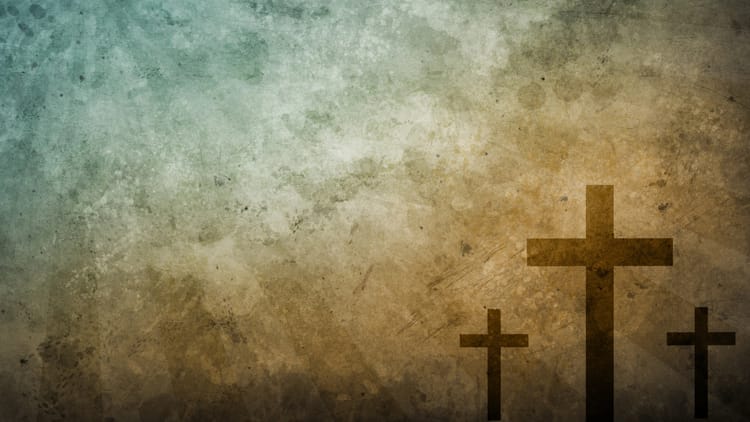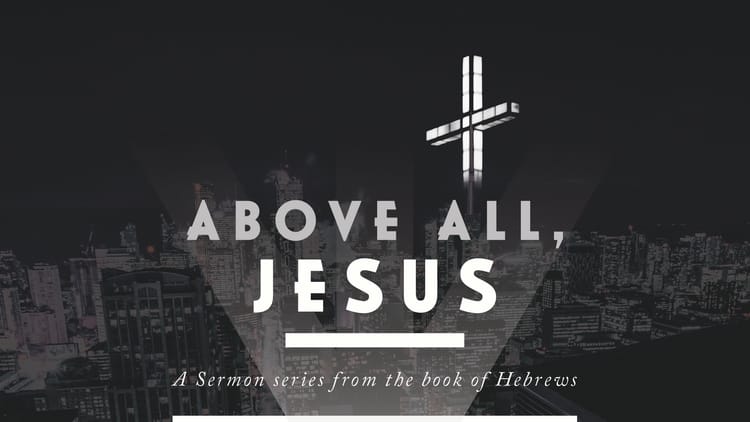I Choose a Mortal Life (Hebrews 2:10-18)

On this third Sunday of Advent, you’re invited to a meal. This is a different kind of meal, because the one who invites you is unlike anyone else. He’s a man, and yet he’s God. The meal we’re about to celebrate today is all about the Incarnation: that at a certain point in time and space, God entered the world. He became one of us. Jesus was fully God, and yet at the same time fully man.
We’re about to eat some bread, and the one who’s invited us to eat that bread has a body just like ours, yet claims to be God. He had blood coursing through his veins, yet he claims to be the creator of all life. He’s God, and yet he’s just like us. He walked, he talked, and he slept. He is just like us in every way, except that he created all things and is the very Son of God. True, and yet incomprehensible!
Throughout history, people have struggled to comprehend this. Some people came up with a view called Docetism. It’s a word you can use to impress all of your friends at the next Christmas party. It’s the belief that Jesus wasn’t human, but instead he only appeared to be human. I can see how you might come to that conclusion. There were lots of times throughout the Scriptures that God appeared in physical form, but he didn’t actually become a human then. But, two thousand years ago, God entered the world and became just like us. And he’s invited us to a meal today.
When we think about Jesus and what he’s done for us, we often skip right to the end of the story. It’s like we focus on the dramatic ending, and skip the beginning of the story. But there’s a richness in the beginning of the story that we often miss.
Frederica Mathewes-Green, an Orthodox author, writes:
The Incarnation was the great act of obedience to the will of the Father, the initial act that set all else in motion. The entire drama, from beginning to end, is what saves us, not just three hours one Friday…
The sacrifice is the entire Incarnation, not merely the cross; though the cross is central, it is already fully present in Christ’s decision to become human, like a jewel in a setting of gold. (The Church in Emerging Culture)
It’s so obvious, but I never really thought of this until recently. At the point of becoming a human being, Jesus became mortal. We always focus on his death, but there’s one thing about becoming human in the first place. Humans die. All of them! Some die by natural causes or illness. Some die violently. But the minute you become human, the clock starts ticking and it’s only a matter of time before your life is over. At the point of the Incarnation, the eternal God chose a life in which he would eventually somehow die. Even if he hadn’t been crucified, death would have come in some way. His eventual death was part of what Jesus chose when he became human.
This week and next, I want to look at two reasons why Jesus chose to become human, and why he was born. Hebrews 2 gives us the first reason why he became human. Let’s look at it together.
Hebrews has been laying out the case for why Jesus is superior to the angels. The entire book of Hebrews is about the superiority of Jesus in relation to all previous revelation, to Moses and the priests. Although Jesus was superior to the angels, the author makes a brief detour to explain why Jesus became one of us, even though we’re inferior to the angels. Hebrews 2:9 says that he “for a little while was made lower than the angels.”
Hebrews 2:10-11 says:
And it was only right that God-who made everything and for whom everything was made-should bring his many children into glory. Through the suffering of Jesus, God made him a perfect leader, one fit to bring them into their salvation.
So now Jesus and the ones he makes holy have the same Father. That is why Jesus is not ashamed to call them his brothers and sisters.
I guess you could make a case that Jesus isn’t superior because he really didn’t look any different to the rest of us. In fact, he was worse in some ways. When he was conceived, his mother wasn’t married. He grew up in a peasant family and eventually died a felon’s death. It’s hard to argue that Jesus is superior to the angels just looking at his life. But it was all for a purpose. Through his sufferings and his health, he was able to become our “perfect leader,” the pioneer of our salvation.
In order for God to relate to us, one of two things had to happen. In the end, actually, both do happen. Either we have to become like God, or God had to become like us. We know that God is at work in our lives and making us more in to the image of his Son, but that is still in progress. God took the first step and became like one of us. Before he brought “his many children to glory,” he made Jesus into one of us, so he could become the pioneer of our salvation. He became one of us, and shared our flesh and blood.
Then the author unpacks two amazing concepts about what Jesus was able to do because he became human. Humanity faces an enemy that we’re powerless to defeat. That enemy is death, and the reason for death is the devil. One of us had to defeat death, but it’s impossible for us to do so. That’s when God sent in the ultimate ringer to win on our behalf. He became human to defeat Satan and to defeat death. Verses 14 and 15 say:
Because God’s children are human beings-made of flesh and blood-Jesus also became flesh and blood by being born in human form. For only as a human being could he die, and only by dying could he break the power of the Devil, who had the power of death. Only in this way could he deliver those who have lived all their lives as slaves to the fear of dying.
This is one of the great themes of early Christianity: Christus Victor, Christ as victor over Satan and over death. The fear of death was real and significant back then. It’s easy to be calm in talking about death until you’re actually facing it. Christ became one of us so he could defeat the Devil and his power over death, so we could be freed from the power of death.
The author continues:
We all know that Jesus came to help the descendants of Abraham, not to help the angels. Therefore, it was necessary for Jesus to be in every respect like us, his brothers and sisters, so that he could be our merciful and faithful High Priest before God. He then could offer a sacrifice that would take away the sins of the people. Since he himself has gone through suffering and temptation, he is able to help us when we are being tempted. (Hebrews 2:16-18)
Here’s another reason why Jesus became human. He came to defeat death as a man, because no man or woman was able to do so. He also came to act as our High Priest, as only a human could do. He offered the perfect sacrifice on our behalf: himself. If he had offered an animal’s blood, he would have had to offer himself year after year. Instead, he offered his own blood so that we could be forgiven.
Today, we’re invited to a meal of remembrance put on by someone who is fully human – still is today! – and yet fully God. He became human so he could be one of us, and defeat death on our behalf. He became human so he could make peace between God and us.
The meal we’re about to experience is in remembrance of his death, but that death is preceded by his arrival as a human to live among us. He came to bring victory over death and to make peace between us and God.
A couple of years ago, the first Lord of the Rings movie came out, Fellowship of the Ring. Arwen, an elf, possessed immortality, but exchanged her immortality out of love. Talking to Aragorn, a human, she asked him if he remembered what she said when they first met. Aragorn replied: “You said you’d bind yourself to me, forsaking the immortal life of your people.”
Arwen committed again to give up her immortality out of love. “I would rather share one lifetime with you than face all the ages of this world alone. I choose a mortal life.”
Jesus came to be fully human and yet fully God. He gave up immortality so he could live and die for us. It’s as if he said to us, “I would rather share one lifetime with you than face all the ages of this world without you. I choose a mortal life.” That’s what Christmas is all about.
He’s invited you to a meal. God, who came to earth to be fully man, was born, and lived and died for us. He chose a mortal life. Let’s enjoy his meal.




